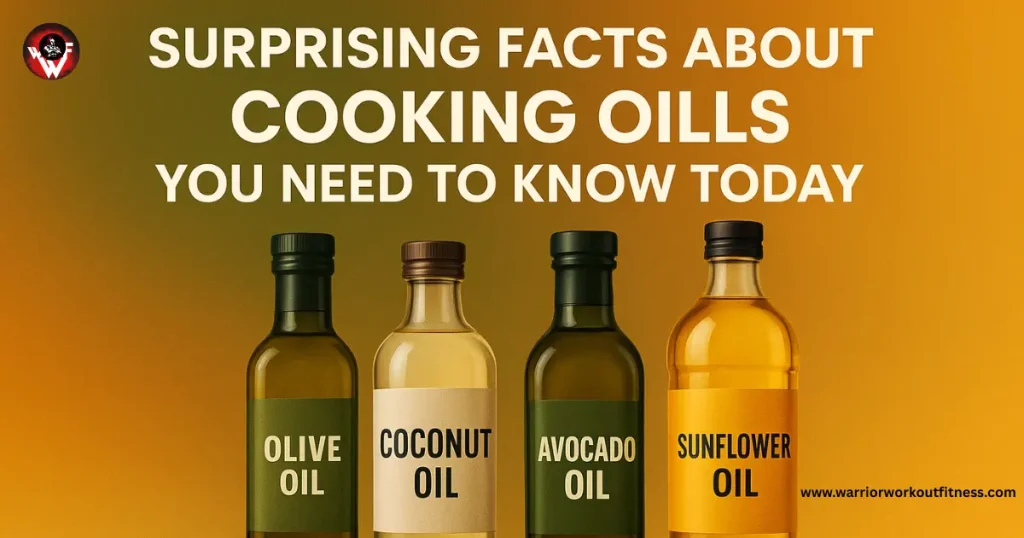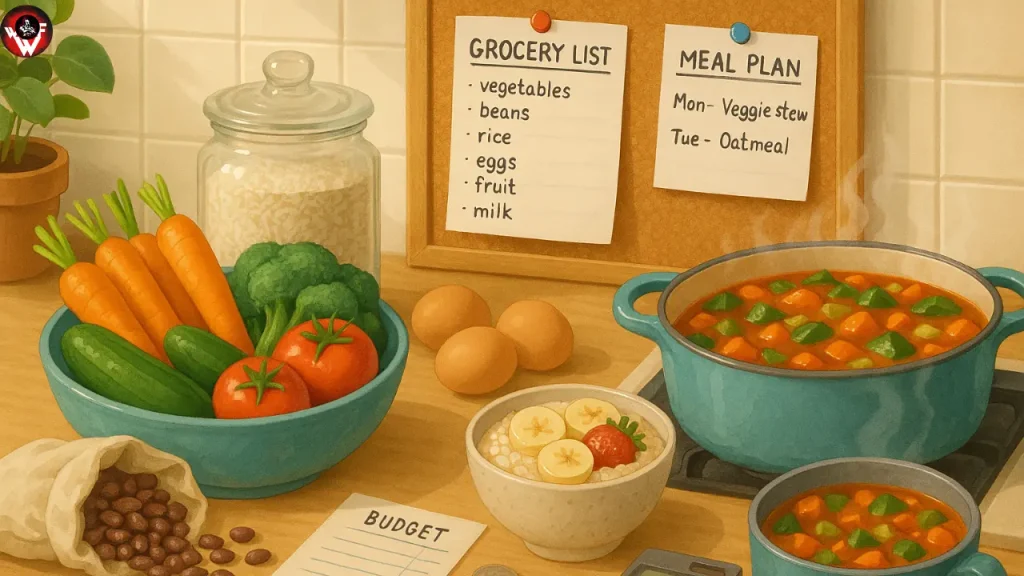Table of Contents
- Introduction: Why Cooking Oils Matter More Than Ever
- The Science Behind Cooking Oils
- Surprising Fact #1: Not All “Healthy Oils” Are Created Equal
- Surprising Fact #2: The Smoke Point Myth Exposed
- Surprising Fact #3: Cold-Pressed vs Refined – The Real Difference
- Surprising Fact #4: Olive Oil Isn’t Always the King
- Surprising Fact #5: Seed Oils Aren’t Always Bad
- Surprising Fact #6: How Oils Affect Brain and Heart Health
- Surprising Fact #7: Sustainable Oils – The Future of Cooking
- Choosing the Right Oil for Every Cooking Method
- How to Store Cooking Oils for Freshness
- Q&A: Your Common Cooking Oil Questions Answered
- Infographic, Visual & Video Ideas
- Conclusion: Rethinking What’s in Your Kitchen Bottle
- References & Resources
Introduction: Why Cooking Oils Matter More Than Ever
Cooking oils are one of the most used — and misunderstood — ingredients in every kitchen. From deep-frying to dressing salads, we rely on them daily. But did you know that the oil you choose can influence heart health, inflammation, brain function, and even environmental sustainability?
In 2025, the global cooking oil market surpassed $300 billion (Statista, 2025), driven by the rise in plant-based diets and health-conscious consumers. Yet, many of us are still unclear about which oils are truly healthy — and which ones are marketing hype.
This article explores seven surprising facts about cooking oils, backed by the latest science, expert insights, and sustainability trends.
The Science Behind Cooking Oils
Cooking oils are made of fatty acids — mainly monounsaturated (MUFA), polyunsaturated (PUFA), and saturated fats (SFA).
| Type | Examples | Typical Sources | Health Effect |
|---|---|---|---|
| Saturated | Coconut, Palm | Animal fats, tropical oils | Energy, but excess linked to LDL cholesterol |
| Monounsaturated | Olive, Avocado | Nuts, seeds | Heart-friendly, anti-inflammatory |
| Polyunsaturated | Sunflower, Soybean | Omega-3, Omega-6 rich | Brain and heart benefits |
Surprising insight: The balance between Omega-3 and Omega-6 is more important than their individual amounts. Most Western diets have a 20:1 ratio, while experts recommend 4:1 or lower (Harvard Health, 2024).
Not All “Healthy Oils” Are Created Equal
The label “heart-healthy” is not always what it seems. Many cooking oils undergo chemical refining, deodorizing, and bleaching that strip away nutrients.
For example:
- “Light” olive oil often means light in flavor, not calories. It’s usually heavily refined.
- Vegetable oil blends can include palm, soybean, and rapeseed oil — some partially hydrogenated, containing trace trans fats.
Case study: A 2024 analysis by the American Journal of Clinical Nutrition found that 60% of oils labeled as “healthy” in U.S. grocery stores had oxidized lipids — compounds that can damage cells and arteries.
Takeaway: Choose oils with clear labeling: cold-pressed, unrefined, and single-origin when possible.
The Smoke Point Myth Exposed
You’ve likely heard: “Always cook with oils that have a high smoke point.” But that’s an oversimplified myth.
The smoke point — the temperature where oil starts to smoke — doesn’t always indicate stability or health safety. What matters more is oxidative stability, or how the oil’s structure holds up under heat.
Example:
- Avocado oil has a high smoke point (520°F) and strong oxidative stability.
- Sunflower oil also has a high smoke point (450°F) but poor stability due to high Omega-6 content, which breaks down easily.
Expert Tip (Dr. Maria Chen, Food Science Institute, 2024):
“The healthiest cooking oils are those that maintain antioxidant compounds even after heating — like extra virgin olive oil and high-oleic sunflower oil.”
Quick Guide:
| Cooking Method | Best Oils | Avoid |
|---|---|---|
| Deep frying | Avocado, refined peanut | Flaxseed, unrefined sesame |
| Sautéing | Olive, canola, ghee | Coconut (for neutral flavor) |
| Salad dressing | Flaxseed, walnut, sesame | Refined vegetable blends |
Cold-Pressed vs Refined – The Real Difference
Cold-pressed oils are extracted mechanically without heat, retaining vitamins and antioxidants.
Refined oils undergo high-heat and chemical processing to improve shelf life but lose nutrients.
| Property | Cold-Pressed | Refined |
|---|---|---|
| Extraction | Mechanical (≤45°C) | Heat & chemical solvents |
| Shelf Life | 6–12 months | Up to 2 years |
| Nutrients | High | Reduced |
| Flavor | Natural, aromatic | Neutral |
Consumer insight (NielsenIQ, 2025): 48% of U.S. households now purchase at least one cold-pressed oil — a 12% rise from 2023.
Olive Oil Isn’t Always the King
Olive oil dominates the “healthy oil” conversation, but not all olive oils are equal.
Fake Olive Oil Alert: A 2024 European Food Safety Authority report found that one in four “extra virgin” olive oils sold online was adulterated — often diluted with cheaper seed oils.
Pro tip: Check for certification seals like:
- COOC (California Olive Oil Council)
- NAOOA (North American Olive Oil Association)
- EU PDO/PGI labels (for European products)
Alternative oils to consider:
- Avocado oil: Similar MUFA profile but higher smoke point.
- Camelina oil: Excellent Omega-3 ratio, emerging in 2025 as a sustainable choice.
Seed Oils Aren’t Always Bad
Seed oils like soybean, sunflower, and canola have been criticized online — but recent studies show the truth is more nuanced.
Harvard Medical Review (2024) concluded:
“Moderate intake of minimally processed seed oils does not increase inflammation or cardiovascular risk when balanced with Omega-3 intake.”
Why the confusion?
- Industrial seed oils (refined, high-heat processed) can form oxidation byproducts.
- Cold-pressed or high-oleic versions are much safer and nutritionally rich.
Balanced approach:
- Mix seed oils (PUFA-rich) with stable oils (MUFA-rich) in your diet.
- Prioritize diversity, not dogma.
How Cooking Oils Affect Brain and Heart Health
Your cooking oil choices can directly affect mental clarity, memory, and cardiovascular health.
Recent research (NIH, 2025) found:
- Diets high in olive, avocado, and flaxseed oils correlate with 30% lower Alzheimer’s risk.
- High intake of trans fats or oxidized oils links to higher rates of stroke and depression.
Omega-3s in focus:
- Flaxseed and walnut oils are rich in ALA, converted in the body to DHA and EPA — essential for brain function.
- Pair these oils with antioxidants (like vitamin E) to reduce lipid oxidation.
Heart-healthy swaps:
- Replace butter or lard with avocado oil for daily cooking.
- Use extra virgin olive oil in place of margarine on toast or salads.
Sustainable Oils – The Future of Cooking
Sustainability is shaping how oils are produced, packaged, and marketed in 2025.
Trends to watch:
- Regenerative farming: Used for olive and canola crops to reduce soil erosion.
- Algae-based oils: Rich in Omega-3s, now used in vegan and fortified foods.
- Upcycled cooking oils: Restaurants in Europe are converting used oils into biofuels and skincare products.
Environmental note: Palm oil remains controversial due to deforestation, but RSPO-certified sustainable palm oil is gaining traction globally.
What you can do:
- Look for “sustainably sourced” or “RSPO Certified” on labels.
- Support local small-scale producers to reduce carbon footprint.
Choosing the Right Oil for Every Cooking Method
| Cooking Type | Best Oils | Why |
|---|---|---|
| Frying | Avocado, peanut | High oxidative stability |
| Baking | Canola, sunflower | Neutral taste |
| Roasting | Olive, grapeseed | Enhances flavor |
| Salad/Dips | Flaxseed, sesame | Rich in nutrients |
| Asian Cuisine | Sesame, rice bran | Authentic flavor, heat resistance |
Zero-click tip (snippet-ready):
➡ “Use avocado oil for high-heat cooking, olive oil for medium-heat sautéing, and flaxseed oil raw for dressings.”
How to Store Cooking Oils for Freshness
Even the healthiest oil can turn harmful if stored incorrectly.
Storage checklist:
- Keep bottles away from heat and light.
- Choose dark glass or stainless-steel containers.
- Don’t buy in bulk unless you use it quickly.
- Discard oils that smell rancid, sour, or metallic.
Pro tip: Add a small amount of vitamin E capsule oil (antioxidant) to extend shelf life naturally.
Q&A: Your Common Cooking Oil Questions Answered
Q1. What’s the healthiest cooking oil in 2025?
Olive and avocado oils remain top choices for daily use due to high MUFA content and antioxidant stability.
Q2. Can I reuse frying oil?
Yes, but no more than twice. Filter it after use and store in a cool, dark place. Discard if it smells burnt.
Q3. Is coconut oil still healthy?
In moderation. It contains medium-chain triglycerides (MCTs), which boost metabolism but can raise LDL cholesterol if overused.
Q4. Are organic oils better?
Organic ensures fewer pesticide residues but doesn’t guarantee better fatty acid profiles — always check extraction method.
Q5. What’s new in cooking oil tech for 2025?
AI-based oil quality sensors now detect oxidation levels in real-time — used by smart kitchen devices like Samsung’s SmartPan 2025.
Conclusion: Rethinking What’s in Your Kitchen Bottle
Cooking oils are no longer a simple pantry choice — they’re a science-driven, sustainability-linked decision that affects your health and the planet.
Key takeaways:
- Focus on unrefined, cold-pressed oils with balanced fatty acid profiles.
- Avoid marketing buzzwords — read labels for extraction and origin details.
- Store oils properly to preserve nutrients and prevent oxidation.
- Diversify — your body and taste buds will thank you.
Call to Action:
Before your next grocery trip, check your kitchen shelf. Is your go-to oil really the healthiest choice? Try swapping one bottle this week — your future self may thank you.
References & Resources
- Harvard Health Publishing (2024). Fats and Oils: Understanding the Difference.
- NIH Nutrition Research, 2025. Dietary Fats and Cognitive Health.
- Statista, 2025. Global Cooking Oils Market Size.
- EFSA Food Fraud Report, 2024. Olive Oil Authenticity Analysis.
- American Journal of Clinical Nutrition, 2024. Oxidation in Commercial Oils.
- USDA Dietary Guidelines, 2025. Fats & Oils Section Update.
Final Word:
Cooking oils are evolving — and so should our understanding. With smarter choices and a science-backed approach, you can turn every drop of oil into a step toward better health and sustainability.
Visit Our Facebook
Read This Too :
What Happens to Your Body When You Eat Brown Rice Daily,
The Surprising Link Between Vitamin D and Chronic Back Pain



